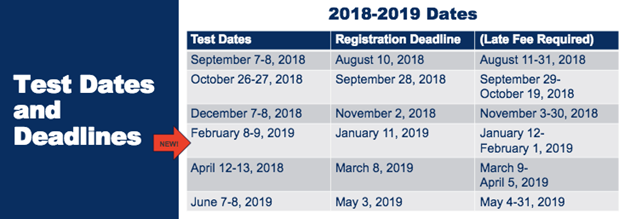ArborBridge’s Guide to Computer-Based Testing:
What We Know & What We Don’t Know
Updated October 16, 2018
Reports from Testing Rollout
This fall, the ACT administered its first computer-based exams for all students outside the U.S. Here are some highlights from the initial rollout, gathered from news sources as well as ArborBridge’s students and counselor networks. Further down, you’ll find updated general information about test sites, dates & deadlines, and more.
Overall Student Experience
The vast majority of students were able to successfully take the exam, and many found certain aspects of the computer-based format to be intuitive and easy to work with—or, at the very least, no more difficult than the paper-based experience. Additionally, most ArborBridge students received official scores comparable to those of their best practice exams during the preparation process, putting to rest fears that the computer-based format would unpredictably swing either individual success or overall scoring.
Test Center Cancellations
While the vast majority of test administrations went smoothly, there were significant problems in some places. As reported by Inside Higher Ed, at least 39 non-U.S. test sites were cancelled at the last minute (within one week of the exam) because they weren’t ready to administer the exam. Students registered for these sites were reassigned to sites within two hours’ commuting distance where possible. If no site was available within that radius, students received refunds for their September exam, or could contact ACT directly if they were willing to travel more than two hours to take the exam for help in finding a seat at a center farther away.
Test Day Glitches
Students at some sites were not able to complete the exam due to technical issues. On social media, we saw reports from site administrators that when they opened for testing on the day itself, the ACT’s computer system experienced glitches that prevented them from checking in students. After troubleshooting with ACT for hours as students waited, these test sites had to cancel the exam. Meanwhile, our own students and test takers reported small tech glitches that disrupted but didn’t cancel testing (such as the entire site’s computers shutting down midway through a section). In these cases, student progress was saved and timers paused so students could resume testing when systems restarted. Our students also reported non-technical hiccups (such as proctors unsure of how to deal with issues or generally unfamiliar with the new exam format).
Takeaways
While most students taking the ACT outside the U.S. going forward can expect to have a positive experience, the prevalence of issues so far, both big and small, reinforces the fact that students must have a back-up test date and plan in mind. They must also be prepared for the glitches that may disrupt their test experience and have the tools to get back into the test mindset once the test resumes.
What We Know & What We Don’t Know
Site Changes
What We Know: In the summer of 2018, the ACT released a full list of 2018-2019 test locations by country. Some schools that have historically hosted the ACT are continuing to do so; others are no longer on the roster. The ACT has also partnered with computer centers that routinely administer other computer-based exams (like TOEFL, GRE, GMAT, etc.). For an in-depth analysis of how test site access has changed, read ArborBridge’s blog post on the topic.
What We Don’t Know: The list of test centers has already changed since they were first announced, and we can expect the landscape to continue changing. You can access the ACT’s recent master list here (updated September 30), but for the most accurate, up-to-date, and relevant information, students should view available sites via the registration process at myact.org.
Dates
What We Know: The test will be offered six times a year (September, October, December, February, April, June). That’s one more time than in the past.
What We Don’t Know: It is up to the test centers which dates they will offer, and many are not offering all six. Students should check exact date availability at their desired test centers via the registration process at myact.org.
Four Testing Windows
What We Know: For each “test date,” ACT will offer the test four times (Friday morning and afternoon and Saturday morning and afternoon), with a stated intention that this will create more flexibility for students and centers. The ACT has requested that centers that offer the afternoon test on any given day need to also offer the morning test. Students will have the option to select their testing window at the time of registration, pending center availability.
What We Don’t Know: It is up to the test centers to decide which testing windows they will offer, and many are not offering all four. Students should check exact testing window availability at their desired test centers via the registration process at myact.org.
Cost
What We Know: The cost of the international ACT without writing will be $150 (up from $103.50); with writing, it will cost $166.50 (up from $120).
Registration Details & Deadlines
What We Know: Registration for the all 2018-2019 test dates is currently open. Students register for the international test via a new portal, MyACT.org. Students who took the paper-based exam previously will have to make a new registration account. There will be no standby testing available at CBT centers. Late registration deadlines will be a week before the exam. See the full table of international dates and deadlines for the 2018-2019 school year below.


